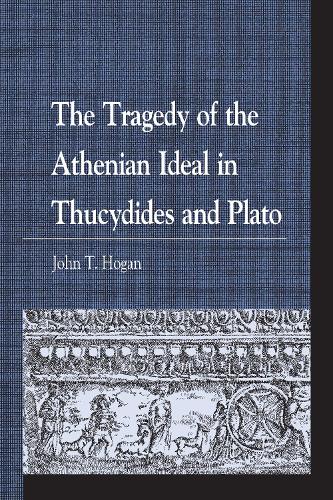
The Tragedy of the Athenian Ideal in Thucydides and Plato
(Hardback)
Available Formats
Publishing Details
The Tragedy of the Athenian Ideal in Thucydides and Plato
By (Author) John T. Hogan
Bloomsbury Publishing PLC
Lexington Books
1st July 2020
United States
Classifications
Professional and Scholarly
Non Fiction
Ancient history
European history
Political science and theory
320.01
Physical Properties
Hardback
374
Width 160mm, Height 229mm, Spine 27mm
689g
Description
John T. Hogans The Tragedy of the Athenian Ideal in Thucydides and Plato assesses the roles of Pericles, Alcibiades, and Nicias in Athens defeat in Thucydides Peloponnesian War. Comparing Thucydides presentation of political leadership with ideas in Platos Statesman as well as Laches, Charmides, Meno, Symposium, Republic, Phaedo, Sophist, and Laws, it concludes that Plato and Thucydides reveal Pericles as lacking the political discipline (sophrosune) to plan a successful war against Sparta. Hogan argues that in his presentation of the collapse in the Corcyraean revolution of moral standards in political discourse, Thucydides shows how revolution destroys the morality implied in basic personal and political language. This reveals a general collapse in underlying prudential measurements needed for sound moral judgment. Furthermore, Hogan argues that the Statesmans outline of the political leader serves as a paradigm for understanding the weaknesses of Pericles, Alcibiades, and Nicias in terms that parallel Thucydides direct and implied conclusions, which in Pericles case he highlights with dramatic irony. Hogan shows that Pericles failed both to develop a sufficiently robust practice of Athenian democratic rule and to set up a viable system for succession.
Reviews
"John T. Hogan brings Thucydides and Plato into dialogue in this book. He does a masterful job of comparing Platos and Thucydides views of Athens as an imperial power, and their views on Pericles and Alcibiades, the nature and goodness of democracy, the purpose and value of democratic rhetoric, what counts as statesmanship, and more. The most intriguing content in this book is Hogans extensive treatment of Alcibiades as Thucydides saw him and Alcibiades, Socrates erstwhile lover, as Plato saw him. This book is an excellent resource not only for understanding ancient history but the impact of the decline in democratic rhetoric at any time." -- Laurie Johnson, Kansas State University
"This book analyzes Thucydides presentation of the deterioration of political debate and conceptual categories at Athens during the Peloponnesian War. In so doing, it also explores manifold points of contact between Thucydides and Plato, highlighting their common concerns and persistent examination of contemporaries such as Pericles or Alcibiades. It thus fills an important desideratum of contemporary scholarship, which is entirely lacking in book length studies of the relation between the two authors." -- Edith M. Foster, The College of Wooster
Author Bio
John T. Hogan has a Ph. D. in Classical Languages and Literatures from The University of North Carolina at Chapel Hill.
